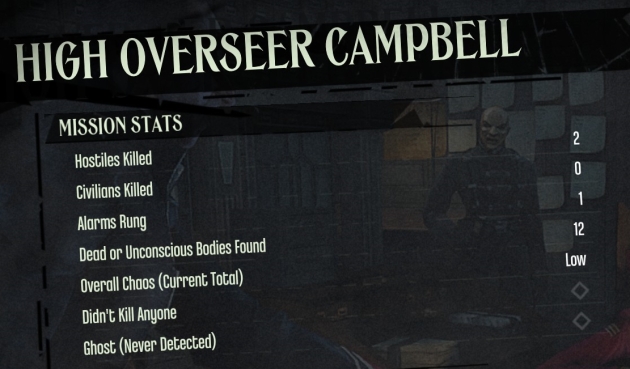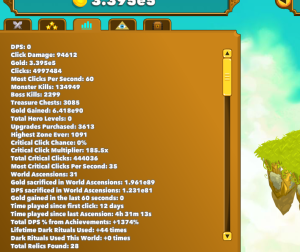This first time I played Deus Ex: Human Revolution, I decided from the start that I wanted to get the Pacifist achievement. I got the motivation from hearing someone talk about their Deus Ex experience and how seeing that Pacifist achievement notification pop up at the end of their run was one of the most satisfying moments in their gaming career. Sounds good to me. As it turns out, I never did get that achievement. About ten hours into my playthrough, I started to get the uneasy feeling that maybe I’d killed someone without knowing it. My memories of the tutorial were a little fuzzy. Maybe I’d killed someone then, thinking it was okay? Reading up on what did and did not count as a “kill” for the achievement, I eventually became convinced that I must have accidentally slaughtered some NPC or another at some point. Discouraged, I gave up on the game. It wasn’t until three years later that I finally gave the game another look, and I didn’t even try the nonlethal route this time.
The problem wasn’t the achievement itself, but the lack of information. There’s no real way to check your kill count in Deus Ex, so the longer the game goes, the more nervous you become. Did some guy fall too far down the stairs? Maybe someone fell off a rooftop? You never really know. I decided not to try Pacifism a second time because I knew the uncertainty would sap my enjoyment of the game. Unfettered by hidden achievement tracking, I enjoyed my time with Deus Ex much more. This time, I actually finished it. Still, it’d be a lie to say that I didn’t feel a little cheated out of my Pacifist trophy.
I just recently started playing Dishonored, and because I don’t learn from my mistakes, I instantly decided I wanted to get the Ghost achievement. It’s a different game with different mechanics, so maybe I can get a different achievement outcome. As it turns out, the basic gameplay loop of Dishonored is shockingly similar to Deus Ex—it’s a first-person stealth game where you knock people out and hide bodies while every enemy is legally blind and wanders around like an idiot without wondering why all of their comrades are disappearing. However, there’s one absolutely massive improvement that Dishonored boasts over Deus Ex, and it’s enough to completely change my experience with the game. Behold, the end of mission screen:
Does that excite you? Because it should. What you’re looking at is an anxiety-killer. A time-saver. An OCD-manager. This little screen is the single difference between fulfillment and depression when you finish the game. Some people don’t care about this screen, but it doesn’t hurt them. The people that do care are eternally thankful.
You might notice that I killed people and was detected during the mission, thus harpooning my Ghost achievement ambitions. What’s funny is that I didn’t think I’d done either. I never purposefully murdered anyone, and I reloaded my game every time I was noticed by an enemy. Clearly, I wasn’t as ghostly as I thought I was, but without this screen I’d have gone through the rest of the game thinking and hoping that I was getting the Ghost achievement. Then, when the game ended and no such message popped up on my screen, I’d have been crushed. I’d feel like my time was wasted. This little bit of information has dramatically improved my experience with the game. You really can’t understate how important this kind of information is to the player. It may very well be the difference between someone recommending the game to their friends, and leaving it in disgust.
Still, don’t get too comfy. There’s a problem. Remember how I said I didn’t think I’d killed anyone or been detected? Though the mission only took me a couple of hours, I was still pretty bummed out to discover that I’d somehow unknowingly failed my goal. I had the option of replaying the mission, but neither the will nor desire to do so. So, no Ghost for me. If this information had been available in-game, during the mission itself, I could have caught the problem much sooner and reloaded an earlier save right away. An information pane or tab on the mission objectives screen would be a great place for such a feature. This is a little more complicated, technically speaking, than just giving a mission summary at the end, but it’s well worth it. You really want to make sure your players have the information they need to tackle any challenges you throw their way. You don’t want them feeling cheated.
As a designer, one the challenges you face is deciding what the player needs to know. Too much information clutters up the interface and becomes confusing; too little and your players feel unfairly hamstrung. So, I’ve come up with a few guidelines:
Guideline #1 – Player progress towards goals should be visible and continually updated.
Here, a goal is something the game tells them to do, whether optional or required, like an achievement or a quest. This also means a player should know when they’ve failed. Don’t rely on temporary messages, like popups, that the player can’t check back on later; players aren’t always paying attention or looking at the screen, so they should be able to check their progress at will. Sometimes a game’s rounds are so short that it’s okay to not tell them immediately of their failure. A fighting game, for example, has rounds that are only minutes in length, so it’s okay if the player can only check their non-critical progress between rounds, rather than during the fight itself.
At first, this guideline sounds unrealistic. Many games have hundreds of achievements, so dedicated progress bars for every little thing sounds like a bad idea. In reality, it’s not nearly so messy. The vast majority of achievements are easily verified by the player using information the game already gives them. An achievement that asks you to beat the game without buying any spells (like Dishonored‘s Mostly Flesh and Steel) is easily checkable by looking at the abilities available to you. Only the unconventional or drawn-out objectives that players can’t check organically need to be tracked.
Guideline #2 – Include a dedicated information dump page.
Clutter is only a problem if you let it sprawl all over your interface. If you’re worried about overwhelming the player with too much information, bundle it all together in a neat little pile and hide it away in some unobtrusive corner of your menus. Players will just ignore it until they need something in there, and then they’ll know where to find it. Although a simple list of statistics may not sound very elegant, it’s a very efficient and inoffensive way to solve the problem.
Giving players access to oodles of information, without letting it clutter up your interface, has the added benefit of letting the community come up with its own goals. You may not think that something like the “total number of Venus Proximity Mines detonated this playthrough” is a particularly helpful stat, but it’ll be a great feature when someone comes up with the “Mars Challenge” that involves playing through the game without using a single Venus Mine. Your interface doesn’t suffer by just adding it to the list with all the other stats, and the potential upside is tremendous.
Guideline #3 – Know your game.
Even if you ignore guidelines 1 and 2 (because your boss didn’t sign off on them, or you’re just lazy, or whatever), take a step back and think about what your game needs. Both Dishonored and Deus Ex are stealth games—the entire point is to get from one place to another without being seen. Both games make a really big deal plot-wise about deciding whether people should live or die. Even forgetting about achievements, that kind of information should be available on demand.
One of the reasons I try to play as many different games as possible is because you can learn a lot from their differing design choices. Although Deus Ex is a fine game, I’m much more able to enjoy my time in Dishonored because of a simple information summary, and even then it’s easy to see how Dishonored‘s design could be improved even further. By taking note of such simple yet important differences, designers can continually improve games like these.
– Saul


